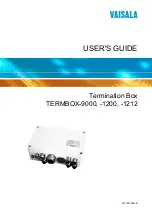
Configuration
3-29
9664-A2-GB20-00
March 2000
Table 3-7.
DLCI Record Options (2 of 3)
DLCI Type
Possible Settings: Standard, Multiplexed
Default Setting:
For user data port DLCIs: Standard
For network interface DLCIs: Multiplexed
Specifies whether the DLCI is standard or multiplexed. This field is read-only when the
selected DLCI is used in a PVC or Management link connection and the DLCI Type is
Standard.
Display Conditions – This option does not appear for the user data port, and it cannot
be changed if the DLCI is specified as the TS Management Link.
Standard – Supports standard DLCIs as specified by the Frame Relay Standards. Use
this setting when a non-FrameSaver unit is at the other end. For user data port DLCIs,
this is the only selection available.
Multiplexed – Enables multiplexing of multiple connections into a single DLCI. Allows a
single PVC through the frame relay network to carry multiple DLCIs as long as these
connections are between the same two endpoints (proprietary). Do not select
Multiplexed unless there are FrameSaver units at both ends of the connection.
CIR (bps)
Possible Settings: 0 – 128000
Default Setting: 64000
Determines the data rate for the DLCI that the network commits to accept and carry
without discarding frames; the CIR in bits per second. Entry of an invalid rate causes the
error message
Value Out of Range (0 –
x
)
, where
x = the maximum line rate
available on the port.
0 –
maximum CIR rate – Specifies the DLCI’s committed data rate.
Tc
Possible Settings: 1 – 65535
Default Setting: Read Only
Displays the DLCI’s calculated value of its committed rate measurement interval (Tc) in
milliseconds. This value is calculated based upon the settings for the Committed Burst
Size Bc (Bits) and CIR (bps) options.
Committed Burst Size Bc (Bits)
Possible Settings: CIR, Other
Default Setting: CIR
Specifies whether the DLCI’s committed burst size will follow the CIR, or whether it will
be entered independently. This value is the maximum amount of data that the service
provider has agreed to accept during the committed rate measurement interval (Tc).
CIR – Uses the value in the CIR (bps) option as the committed burst size (Bc). The Bc
and excess burst size (Be) options are updated when a CIR update is received from the
network switch.
Other – Allows you to specify the committed burst size for the DLCI. When Other is
selected, the Bc and Be values must be manually entered and maintained, as well.
Содержание FrameSaver SLV 9664
Страница 1: ...FrameSaver SLV 9664 USER S GUIDE Document No 9664 A2 GB20 00 March 2000 ...
Страница 18: ...About the FrameSaver SLV 9664 1 6 9664 A2 GB20 00 March 2000 This page intentionally left blank ...
Страница 28: ...User Interface and Basic Operation 2 10 9664 A2 GB20 00 March 2000 This page intentionally left blank ...
Страница 130: ...Operation and Maintenance 5 36 9664 A2 GB20 00 March 2000 This page intentionally left blank ...
Страница 150: ...Troubleshooting 6 20 9664 A2 GB20 00 March 2000 This page intentionally left blank ...
Страница 182: ...Setting Up Network Health for FrameSaver Devices 9 10 9664 A2 GB20 00 March 2000 This page intentionally left blank ...
Страница 186: ...Menu Hierarchy A 4 9664 A2 GB20 00 March 2000 This page intentionally left blank ...
Страница 214: ...SNMP MIBs and Traps and RMON Alarm Defaults B 28 9664 A2 GB20 00 March 2000 This page intentionally left blank ...
















































